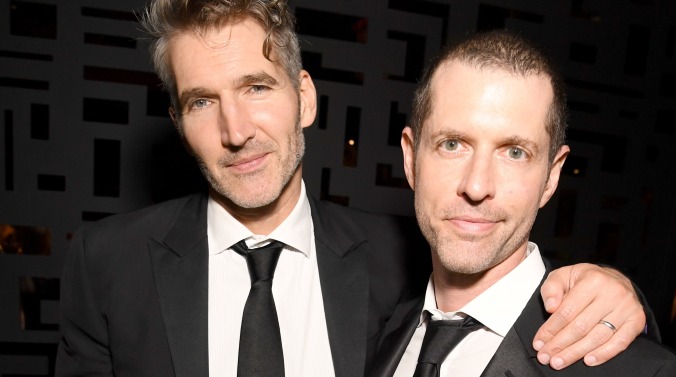It would be foolish to attempt to compare the current beef raging between Netflix and Disney to the latter company’s second-hand series of Star Wars movies; after all, it’s hard to cast anybody as a plucky underdog resistance when they’re spending billions a year on content acquisition and marketing, as the online streamer so determinedly is. And yet, it’s not hard to see the way this rapidly-heating Cold War between the two entertainment giants—one young and expansionist, the other older and far more entrenched—has began to divide loyalties and, occasionally, blow up something pretty fucking big. Like, say, David Benioff and D.B. Weiss’ planned trilogy of Star Wars movies, which appear to have become a casualty of—among other factors—the current tug-of-war the two companies are waging over the hearts and minds of some of Hollywood’s most prominent creators.
This is per The Hollywood Reporter, which issued a deep-dive report today into why, exactly, Benioff and Weiss—fresh off the decidedly mixed reception to the final season of their landmark HBO series, Game Of Thrones—announced on Monday night that they were walking away from every* filmmaker’s dream, i.e., helming their own Star Wars movie.
(*Note: “Every” in this sentence does not, presumably, include Josh Trank, Colin Trevorrow, or Chris Miller and Phil Lord, all of whom have been fired from Star Wars movies in the seven years since Disney acquired the franchise. Which we have to assume was not their dream, unless it’s one of those ones where your teeth keep falling out of your head and also Disney humiliates you in the most public fashion imaginable.)
Specifically, it sounds like Lucasfilm president Kathleen Kennedy was unhappy that the pair were intending to split their attention from their duties on this new Star Wars trilogy with an overall deal they recently signed with Netflix—especially since the pair’s most prominent project in recent years frequently struggled to meet deadlines when producing a smaller-than-average number of hours of TV per year anyway. (Admittedly: They were pretty ambitious hours.)
Weiss and Benioff have been open about their inexperience with filmmaking pre-Game Of Thrones, most notably in a recent Q&A they gave that put off the impression of a couple of guys failing upwards with a velocity and precision rarely afforded to outright success. The duo do have some small track record of writing movies—Benioff having penned screenplays for both Troy and X-Men: Origins: Wolverine—but the pair’s directing experience is basically relegated to a couple of episodes of Thrones, and their ability to multi-task production work is essentially unproven. (Compare with their fellow Netflix acquisitions Ryan Murphy and Shonda Rhimes, both of whom have TV empires to their names, and who know how to delegate and split attention between numerous projects without much slipping through the cracks.)
None of this, according to sources close to the situation, was helped by the current tension between Netflix and Disney. While Netflix was reportedly fine with Benioff and Weiss making Star Wars their top priority, it also included a stipulation in their deal that they had to be present on the sets of any shows they produced, essentially forcing them to divide at least some of their production time over the next few years. (Compare this with the situation around J.J. Abrams, who essentially shelved all of his work for his now-former partners at Paramount whenever Disney came calling.) There’s also just the fact that tossing themselves into the arms of the always-loving Star Wars fandom after becoming internet hate objects over the last few years of GoT apparently sounded about as appealing to the two as swan diving into a meat grinder. “This was in the ‘Life’s Too Short’ category,” one source is reported to have said about their thinking.
All told, it’s really a sort of perfect storm of factors, all conspiring to keep Benioff and Weiss away from that big brass galactic ring. It’s also a reminder that having one hit TV show—even the biggest hit of its generation—isn’t a necessary guarantee of success, as the duo’s post-Thrones run of now-aborted projects (which also includes HBO’s Confederate) has pretty well and truly shown.













![HBO teases new Euphoria, Larry David, and much more in 2026 sizzle reel [Updated]](https://img.pastemagazine.com/wp-content/avuploads/2025/12/12100344/MixCollage-12-Dec-2025-09-56-AM-9137.jpg)



























